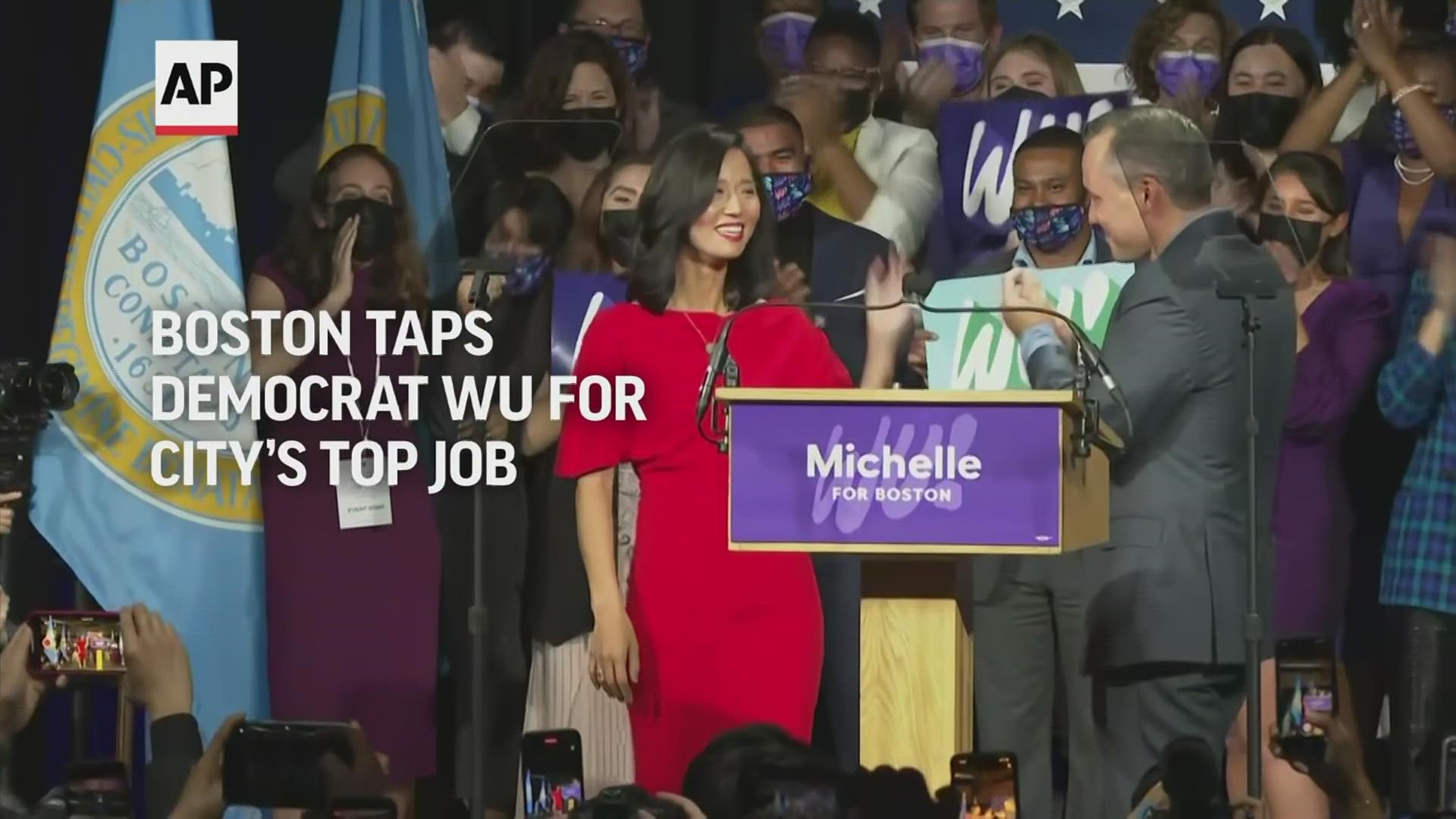BOSTON — Michelle Wu, a Democrat, became the first woman and person of color to be elected mayor of Boston, The Associated Press projected Tuesday.
Wu, the daughter of Taiwanese immigrants, defeated fellow Democrat Annissa Essaibi-George, ending the city’s 200-year history of electing white men. Acting Mayor Kim Janey became the first Black woman to hold the seat after Marty Walsh, who had served as mayor since 2014, resigned in March to become President Joe Biden’s labor secretary.
“One of my sons asked me the other night if boys can be elected mayor of Boston. They have been, and they will again someday, but not tonight,” Wu told supporters Tuesday night. “On this day, Boston elected your mom because, from every corner of our city, Boston has spoken.”
“We are ready to meet this moment. We are ready to become a Boston for everyone,” she added. “We are ready to become a Boston that doesn’t push people out but welcomes all who call our city home. We’re ready to be a Boston where all can afford to stay and thrive. And, yes, Boston is ready to become a Green New Deal city.”
Among a particularly diverse field of candidates, Wu remained a front-runner, maintaining a wide margin in the polls against Essaibi-George — a fellow city councilor who identifies as Arab American — leading the race by 30 points just days before the election, according to a survey by Emerson College. All the major candidates in September’s preliminary election — Andrea Campbell, John Barros, Janey, Wu, and Essaibi-George — were also people of color, and four of five were women.
Wu, who made history in 2016 as the first Asian American to serve as president of the City Council and was favored by the city’s progressives, secured several key endorsements during her campaign, including from both of the state’s U.S. senators, Elizabeth Warren — with whom Wu studied law at Harvard — and Ed Markey. She also received backing from Janey and Democratic Rep. Ayanna Pressley.
The historic win comes amid Boston’s shifting demographics over the past decade. The city’s white population waned while the overall population grew roughly 9.7 percent, according to census data released this year. The Asian and Hispanic communities in particular experienced significant growth. Though Boston remained one of the last Northeastern cities to never have elected a person of color, its city’s politics had become more diverse in recent years, with the City Council made up primarily of women and people of color.
Wu, whose campaign focused on issues of equity, like rent stabilization and free public transit, fared better among all racial groups, including Hispanic, Black, and Asian voters, a poll conducted by Suffolk University, The Boston Globe, and NBC10 showed. While Essaibi-George did best among white voters, Wu still out-performed her, drawing 61 percent of the group.
While Wu previously told NBC Asian America that she aimed to represent all communities in Boston, she embraces her Taiwanese immigrant heritage — something that significantly influenced her life. Her father, Han, immigrated to the U.S. to study at the Illinois Institute of Technology as a grad student. Without a strong grasp of English, Wu still often served as the family interpreter, assisting with translations since she was as young as 4.
Wu, who grew up in Chicago, explained that in those early years, her family found themselves the targets of racist harassment. But her parents encouraged her to ignore such taunts, focusing on “keeping your head down, and working harder.”
“So many of us [have known] our whole lives what it feels like to be both invisible and also always sticking out, but not seen for the person you are, [and] judged and discriminated against simply because of appearance,” she said.
A career in politics, however, wasn’t something she initially thought would be in her future. With grandparents who had fled to Taiwan during the civil war in mainland China, such topics represented “fear and famine,” Wu said.
“We were supposed to keep our heads down and study hard and get a good, stable, high-paying job to support the family,” she said.
But when her mother was diagnosed with schizophrenia and Wu filed for legal guardianship of her youngest sister when she was 22 while still in law school, plans for a traditional life of stability no longer took priority, she told The New York Times.
“Life feels very short when that kind of switch happens,” Wu said.
She became more politically involved, developing a close friendship with Warren, then her contract law professor. The bond would prove a defining factor in Wu’s involvement in city politics, and by 2012, she would go on to become the second woman of color to earn a seat on the council. Pressley, who was elected to City Council in 2009, was the first.
Wu’s win is of major significance to the Asian American community, a group that has been underrepresented among mayors of U.S. cities. Six current leaders of America’s 100 largest cities are Asian American, with all in either California or Texas, according to the Asian Pacific American Institute for Congressional Studies.
Speaking after the shootings at spas in the Atlanta area in March, in which six of the victims were women of Asia descent, Wu underscored the importance of advocacy and participation from the Asian American community — values that run counter to her own upbringing.
“Now’s the moment for us to speak out,” Wu said. “It’s time to break the cycle of invisibility.”

